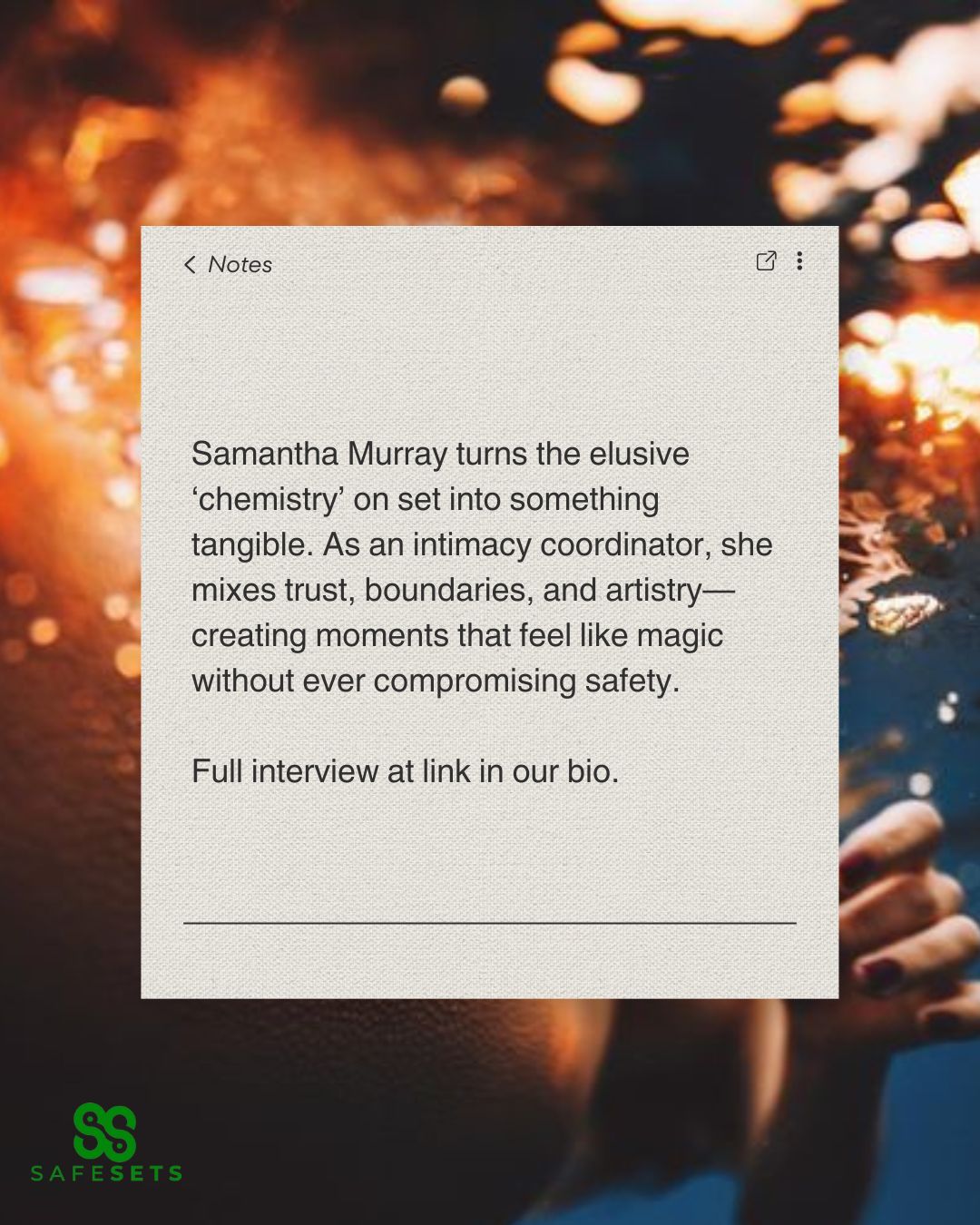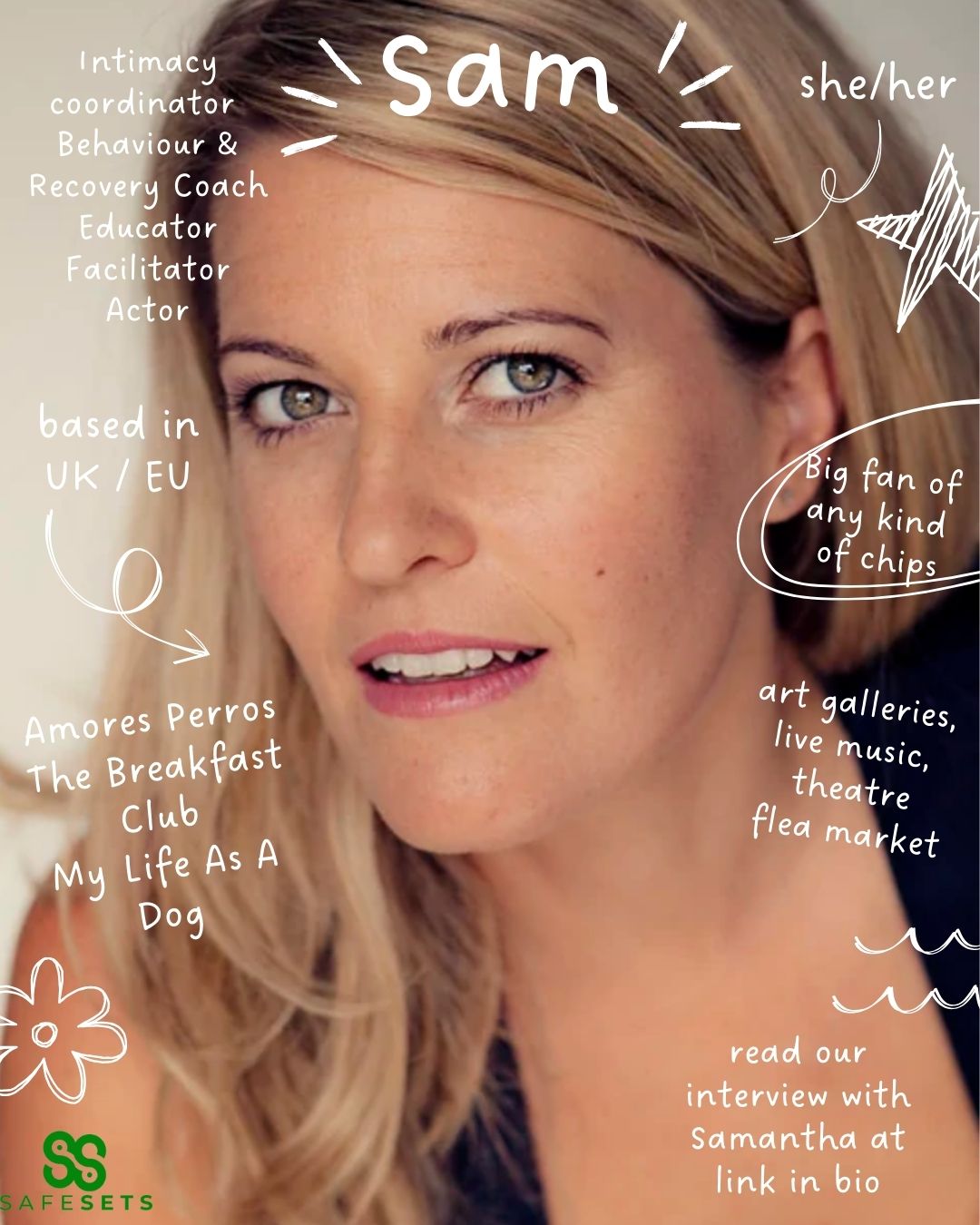The Alchemy of Trust
On set, Samantha Murray's job is part science experiment, part tightrope act.
As an intimacy coordinator, she works in the space between safety and risk – where trust can turn choreography into something that feels like magic.
The chemistry everyone talks about in film isn't always what you think. Samantha Murray knows you can build it between two actors who barely speak off-camera – craft it from movement, timing, and framing. But the real prize, she says, is rarer: that unpredictable current when trust deepens mid-scene, the moment the whole crew feels the hair on their arms rise.
Murray has worked across Europe and the UK, in spaces as varied as Greek hillsides and cramped set-built bedrooms. Sometimes she's front-and-centre, setting parameters for a complex sequence; other times she's crouched behind a prop, invisible until needed. We met to talk about chemistry, magic, and why she believes in safe people – not safe spaces.
Maude: Let's start with where you first met intimacy coordination as a concept.
Sam: For me, it came from noticing its absence. I first saw Ita O'Brien working in a Guardian video—she was just sitting quietly by the bed in rehearsal, almost in the corner. And I thought, Oh, I know that spot. As a sixteen-year-old actor on set, I'd felt that gap: no one was holding that space for me. Becoming an intimacy coordinator felt like stepping into the role I didn't have.
Maude: I came at it from another angle—seeing it done well. I joined an online workshop with Kate Lush during COVID. She was funny, matter-of-fact, careful, and creative all at once. No mystery, no jargon—just a way of working that felt possible. I thought, I want to be those actors, and I also want to be Kate.
Sam: That tone—caring but dynamic—was exactly what I wanted to bring to set too. It's a new tone for the industry, and when you can impart it to producers or directors, it's a gift.
Maude: People in film love talking about chemistry. We chase it like a high. But I think there's a difference between chemistry and magic. Chemistry feels like potassium and magnesium in a jar—you might make sunscreen, or you might make a bomb. Magic feels more like alchemy.
Sam: Yes. Chemistry is a word that gets thrown around, but what people often mean is that magic—the goosebumps moment, the connection that deepens as we're filming. And here's the thing—you can create chemistry on screen between two actors who don't get on. You can craft it in movement, in framing. That's technical. But magic? That's when the trust is real.
Maude: And you don't just do chemistry experiments without parameters. On set, the parameters—our agreements—are what make it safe to even chase the magic.
Sam: Exactly. Without those boundaries, actors pull back because they're unsure where the lines are. And then people panic—"Oh, we'll lose the chemistry!" But actually, our work as intimacy coordinators often creates the magic. It frees actors to push their boundaries because they know they can land safely.
Maude: It's also not sustainable to expect magic all the time.
Sam: No, it's elusive. But when it's there, everyone on set feels it. It's why I gently steer conversations away from "chemistry" and toward "magic." Chemistry is just one thing. Magic is when two very different acting approaches—one technical, one immersive—still result in the same electricity because the trust is there.
Maude: So, chemistry is science. Magic is art. And intimacy coordination is…
Sam: The laboratory. (laughs) The place where we set the parameters, mix the ingredients, and hope something beautiful—and safe—sparks.
Maude: That brings us to safety. What does it mean to you?
Sam: Controversially—I don't believe in "safe spaces." I believe in safe people and safe practice. The word "safe" can feel boring to an actor who's about to take on something risky and exciting. For me, safety means having creative freedom because you know you can call a halt at any time without fear of consequence.
Maude: And safety won't look the same to any two people.
Sam: Exactly. That's why being physically present is so important—you can't phone it in. You don't always know what scene will trigger someone, or who it will trigger. Sometimes it's not even the actors. I once had a script supervisor so affected by a take they had to step away from the monitor. You can't predict that from a call sheet.
Maude: So boundaries aren't about constraining the work—they're about making it sustainable.
Sam: Yes. It's not about playing it safe—it's about playing to the edges, knowing the court lines so you can hit every corner of the game.

Maude: If you could change one thing in the industry with a magic wand, what would it be?
Sam: I'd take the pressure off actors to decide whether an intimacy coordinator is there. It should be content-based, not actor-requested. The work isn't just about nudity—it's minors, violence, vulnerability. When the role is dictated by content, everyone benefits, and we can be brought in early enough to actually help.
Maude: I'd ask for space. Not more time or money—just one dedicated quiet place on set for anyone who needs it. Somewhere outside the madness, not a corner of craft services.
Sam: That's the thing about our job. We're often wedged behind a bed, hiding on a balcony, crouched in a shower—just trying not to block the light. But if the chemistry, or the magic, is happening, that's exactly where you'll find us: in the wings, keeping the parameters in place so the scene can soar.
Interviewed in August 2025 by Maude Sandham

